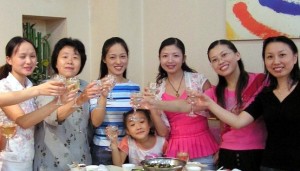Hospital.
Brian Hennessy. China Australia Consult. 2006
Professor Liu of the First Affiliated Hospital in Chongqing, is the matron of a family of senior nurses. She is both mother hen to this mature group, and the beating-heart of her department. She guides her brood with the wisdom of her years and her hands-on experience of nursing in difficult circumstances. She is a well-respected colleague.
Hospital
______________________________________________________________
Her students (all married with one child), working shifts, caring for the sick and dying, and confronting the anger of patients and relatives who distrust the system. Caring for each other also. Juggling everything. The meat in the sandwhich.
Above them, the administrators who work them to the bone. Below, the bottom rungs of Chinese society who can’t afford to pay for the medical services they need. The health system in China is ill. Hospitals must make their own money. There is no social security and no free health-care.
The system has three levels and includes: Skimmers at the top: administrators who inflate the price of medicines to pay for this expensive public service as well as their own private lifestyle.
Exploiters in the middle: doctors who inflate the price of their treatments in order to make a reasonable living. Some of them doing private deals with wealthy patients for priority service. Others offering an illegal service, out of hours, outside the hospital. I know one orthopaedic surgeon who operates (literally & figuratively) in his own home on his day off.
Bottom dwellers: laid-off workers from bankrupt government factories. Dislocated migrant workers whose cheap labor is building new China. Dirt-poor farmers whose products feed the richer middle class in the cities.
China is hierarchy. It has never been any different. One leadership at the top, and everyone else in downward cascading levels of disempowerment. The bottom rung unable to extort anything from anyone below, owing everyone above everything.
Nothing really changes in China. Emperor or Boss, it’s always been like this. And throughout 5,000 years of history the peasants and workers have tolerated, and tolerated, and tolerated. Until life becomes unbearable. Untenable. Then they have nothing to lose. Then they revolt. This is China’s history.
A couple of months ago, corrupt local county officials expropriated peasant land for developers, and pocketed the proceeds. As you do. Naturally the farmers demonstrated against this theft of their land, their livelihood. But demonstrations are illegal. So the authorities called in the police who popped a couple of farmers, beat up a few more, and jailed a representative sample to show who really was boss of the county. “Killing a chicken to frighten the monkeys,” a classic saying. A contemporary reaction. Not an isolated incident.
But you wouldn’t hear about it in the Chinese media. No way. I read it in the New York Times, and other western newspapers. I read it online before big brother got out of bed and blocked the spread of this dangerous western propaganda.
There are many such incidents. Chinese governments have always feared mass movements. So they suppress them before they grow too big and threaten state power and control. Or at least, that's what they fear. In the long run, a dumb reactionary response, for times have changed. Deng Xiao Ping’s Opening and Reform policy has seen to that.
It is just a matter of time. The rich are getting richer, and the 800 million poor are being left behind. I scratch my head and think about the two Chinas that I straddle here in southwest China. What ‘trickle-down’ effect? From where I sit, the money’s going in the opposite direction. The way it always has. Feudal.
And in the meantime, the nurses, the good doctors, and their teachers, keep a sick system running. Ordinary people doing extraordinary things for their countrymen. "One country, two systems." Working class heroes versus a reactionary bourgeoisie.
This is not what Deng Xiao Ping intended. Marx would be horrified. So would Chairman Mao, Liu Shao Qi, Zhou En Lai, and Lin Biao (of Mongolian fame). And that old soldier Zhu De, and his principled brother-in-arms Peng De Huai also.
All of them veterans of the Long March from feudalism to communism. Zhang Jie Shi (Chiang Kai Shek) must be laughing in his Taiwanese grave. Now there was a feller who knew something about feudalism and its companions: nepotism, graft, and corruption.
.
.


